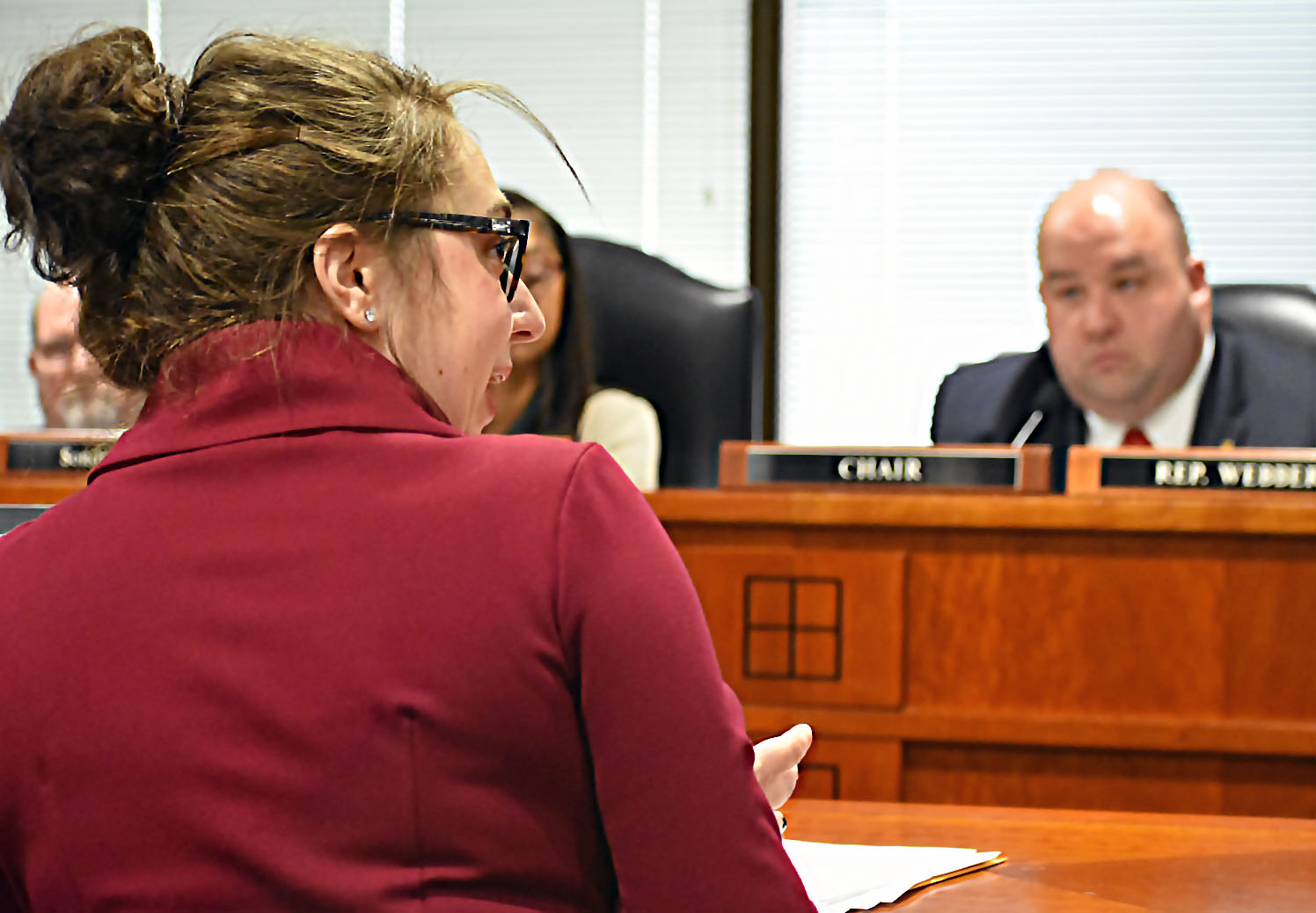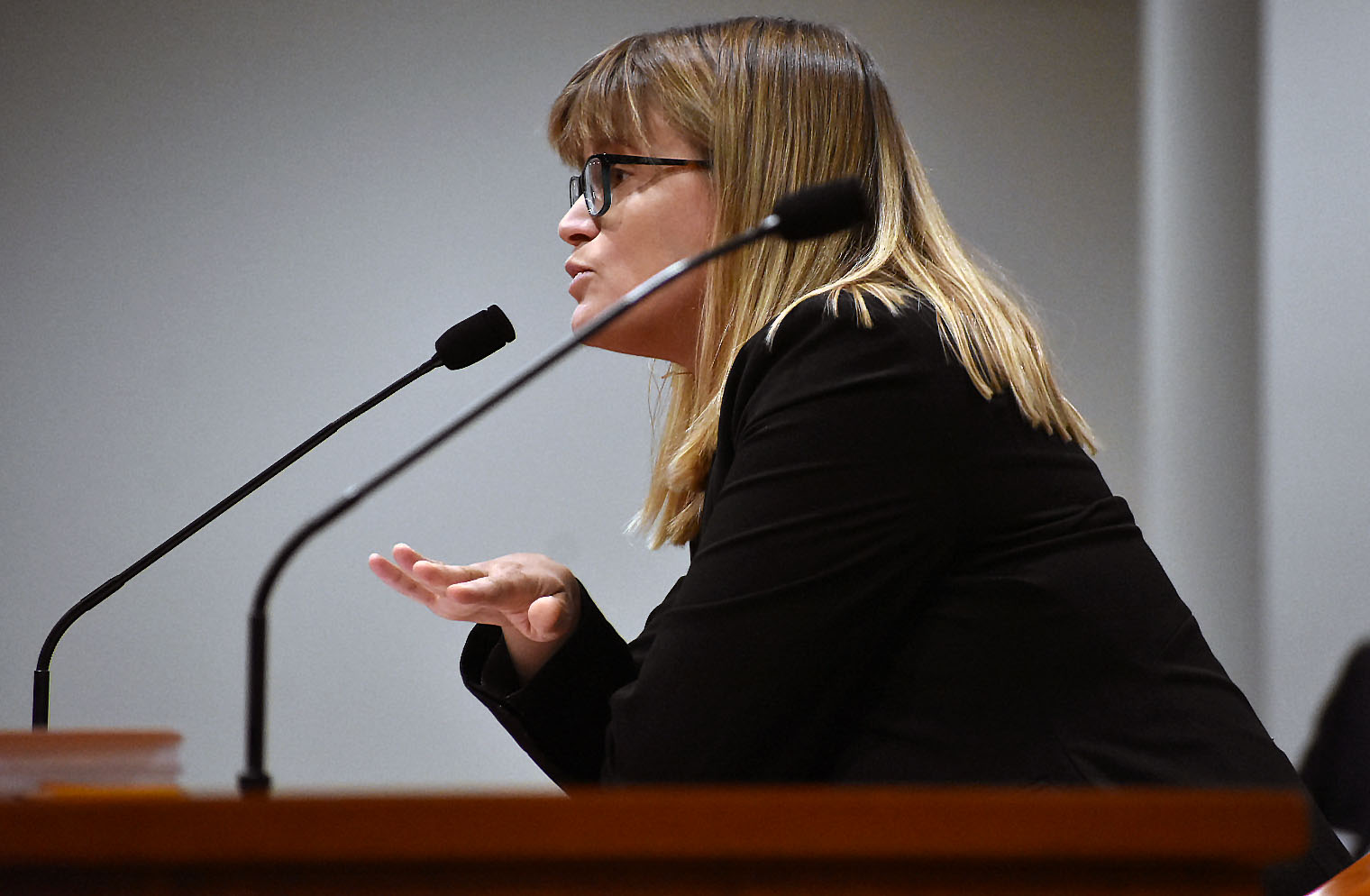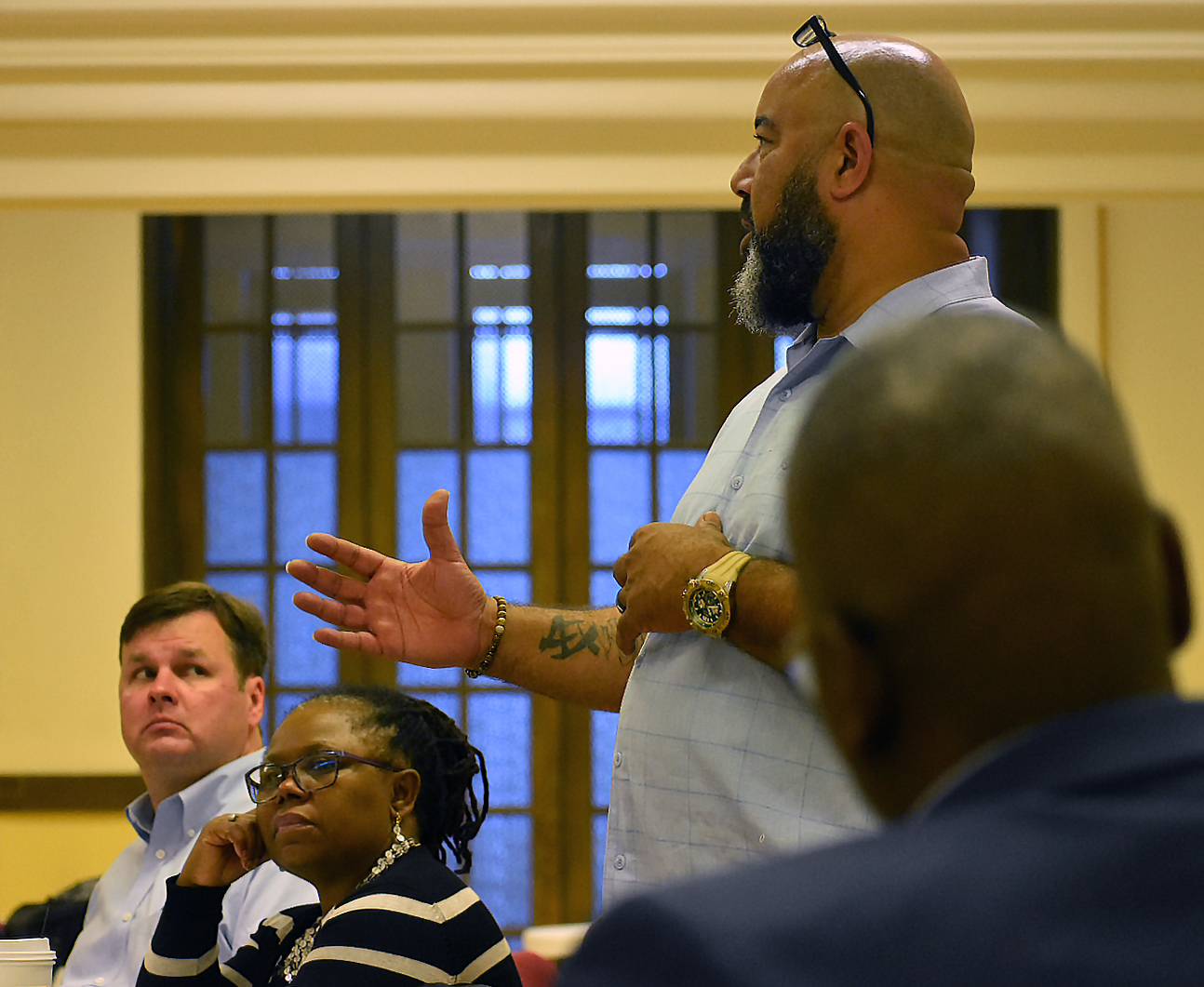As 2019 winds down, we thought we’d take a moment to look back at a busy year for criminal justice reform in Michigan and take stock of all that’s happened. From the introduction of Clean Slate to the passage of Raise the Age, the formation of the Joint Task Force on Jail and Pretrial Incarceration to the disbanding of the Criminal Justice Policy Commission, Safe & Just Michigan has been active in bringing about positive change to our state. Here’s our Top 10 List for criminal justice reform in Michigan in 2019:
- “Good character” legislation introduced

Anna Kohn, chief impact officer of RecoveryPark in Detroit and a Safe & Just Michigan board member, delivers testimony in favor of modifying the “good moral character” component of state occupational licensing requirements. She read testimony written by RecoveryPark founder and CEO Gary Wozniak at a meeting of the House Regulatory Reform Committee on May 21, 2019.
It’s well-known that people with a criminal record often struggle to find a good job, but finding an employer who will give them a chance isn’t the only obstacle. Many careers require would-be job seekers to obtain state licenses in order to work. These careers are as diverse as carpentry, cosmetology, real estate and funeral director. One of the requirements of these licenses is “good moral character,” and that includes not having a felony or certain misdemeanors.
Bills that were re-introduced in 2019 would change the state’s Licensing and Regulatory Affairs Department requirements to not issue blanket denials of a license on the basis of a criminal record. Instead, a denial would only be issued if a record contained a disqualifying felony, meaning an offense that was somehow related to the license requested (ie, a conviction for child abuse would disqualify for a child care license), and the licensing board decides the denial of the license is required for public safety (see our blog post for the full criteria). The bills had a hearing before the House Regulatory Reform Committee but are still awaiting a vote there.
- Insurance agent licensure reform enacted
One licensure reform measure did manage to make it through the legislative process and get signed into law. A new law makes it possible for people who were convicted of a felony to obtain a license to sell insurance once their conviction has aged 10 years, so long as the conviction is nonviolent, is not for a sex offense and was not a financial crime. It also updates the “good moral character” requirement of the licensure requirements to stipulate that people with a criminal record are not automatically disqualified for a license.
“A past felony conviction that is completely unrelated to the insurance realm should not end an aspiring insurance agent’s ability to sell insurance in the state of Michigan,” said Rep. Michele Hoitenga (R-Manton), who sponsored the bill that became the law. “This is about giving people an opportunity to turn their lives around, be productive members of society and provide for their families. No longer will a blanket prohibition deny them that chance.
- Prison population continues to fall
It’s a trend we’ve been watching since 2007, and one we’d like to see continue — Michigan’s prison population continued its downward slide last year. In November, the Michigan Department of Corrections issued its annual statistical report, showing that the prison population was 38,761 on Dec. 31, 2018, down 905 people or 2.3 percent from the prior year. And that’s good news.
But there’s concern the good news won’t last forever. Unless new, stronger criminal justice reforms are instituted, Michigan Department of Corrections spokesman Kyle Kaminski told legislators in February this decrease will likely taper off or could turn into increase. That’s because Michigan has the longest average prison sentences in the country, and that average is getting slightly longer year-by-year. So, while fewer people may be sent to prison each year, they are staying for ever-longer sentences. Already, about a quarter of the people incarcerated in Michigan are serving sentences of 20 years or more, including life. Safe & Just Michigan will continue to advocate for policies to reduce length of stay.
- Starr-Prescott paper proves benefits of expungement; challenge in accessing them

Dr. Sonja Starr offers testimony on Clean Slate legislation before the House Judiciary Committee on Sept. 24. 2019.
Michigan has had an expungement process for decades. However, those expungements have been limited in availability, and the people who qualify for them have had to jump through many hoops to get them. What effect did the challenge of obtaining an expungement have on people’s ability to obtain them, and what were the benefits people realized once they had their record cleared? We had a general idea, but until University of Michigan Law School Professors J.J. Prescott and Sonja B. Starr published their report, “Expungement of Criminal Convictions: An Empirical Study,” we didn’t know for sure.
Now, we have answers. Because of the difficulty in obtaining an expungement, just 6.5 percent of people who qualified for a set aside actually obtained one. However, those who did get their record cleared realized immense benefits. Within two years of getting an expungements, recipients saw their wages increase 25 percent on average, making it easier to support their families, pursue better education or business opportunities and plan for their futures. This research fueled our work to pursue expanded expungement opportunities in Michigan through the Clean Slate initiative, which we will continue in 2020.
- Criminal Justice Policy Commission publishes important research

State Sens. Sylvia Santana (D-Detroit) and Pete Lucido (R-Shelby Township) worked together on the Criminal Justice Policy Commission to produce important research on Michigan’s criminal justice system.
The Criminal Justice Policy Commission, a body formed by the state Legislature, performed some useful work. Their study of sentencing among “straddle cells” — a group of offenses that judges could sentence someone to either probation or prison — showed that there are significant sentencing disparities in Michigan. In particular, there are disparities between counties and depending on whether a person uses a public defender or hires a private attorney, whether they take a plea deal or go to trial, on the basis of gender, and other factors.
Despite those important findings, the Legislature decided this fall to let the commission come to an end. Funding for the CJPC was set to expire at the end of October, and lawmakers declined to extend it, even though Senators Pete Lucido (R-Shelby Township) and Sylvia Santana (D-Detroit) argued in favor of extending it. We’re disappointed that the group was disbanded, and doubly so, as the Criminal Justice Policy Commission was on the verge of investigating the role habitual offender sentencing enhancements play in Michigan’s criminal justice system.
- Civil asset forfeiture reform signed into law
Michigan House of Representatives Speaker Lee Chatfield set the tone for the current legislative session early in January 2019 when he announced the first bill introduced to the House. House Bill 4001, a proposal to significantly overhaul Michigan’s civil asset forfeiture law, was sponsored by Rep. Jason Wentworth (R-Farwell), but Chatfield made it clear that he stood behind the proposal — and moreover, he was signaling that criminal justice reform would be a priority of his Speakership.
The civil asset forfeiture reform plan powered its way through the Legislature in the early months of the year. The plan significantly curtailed the amount of assets that police could confiscate from people who are arrested in drug-related cases, and prohibits police agencies from keeping the assets unless the defendant is convicted or the value of the money and property is more than $50,000, excluding the value of contraband.
- Medically Frail Parole passed into law
Another policy effort several years in the making, the medically frail proposal finally passed into law in 2019. Though the final form of the law was not as strong as Safe & Just Michigan would like it to be, the medically frail law does allow incarcerated people who can no longer perform daily care tasks or who are terminally ill to be paroled out to care facilities.
Unfortunately, the carve-outs included in the law limit its effectiveness, making it applicable to just 20-30 people immediately, and just 500 over the next decade, even though an estimated 850 people in Michigan prisons are thought to be medically frail in prison currently. Safe & Just Michigan will work to see the scope of the law widened, as Michigan’s prison population is expected to grow older as is population serves the nation’s longest prison sentences.
- Michigan Joint Task Force on Jail & Pretrial Incarceration forms

SJM Policy Analyst Josh Hoe gives testimony before the Joint Task Force on Jail and Pretrial Incarceration in Grand Rapids.
In April, Gov. Gretchen Whitmer announced the formation of the Michigan Joint Task Force on Jail and Pretrial Incarceration. Comprised of Lt. Gov. Garlin Gilcrhist, Michigan Supreme Court Chief Justice Bridget Mary McCormack, Attorney General Dana Nessel, Safe & Just Michigan Board Member and A.R.R.O. Program Manager Monica Jahner, bipartisan legislators and others in law enforcement, criminology and social work and government, the task force is seeking alternatives to jail, ways to reduce jail admissions and decrease the average length of stay, and to improve the effectiveness of Michigan’s county jails.
The task force’s work will culminate in a series of policy recommendations expected to touch on topics such as bail, the treatment of people with mental health needs in county jails, the handling of traffic citations vs. arrests, probation and sentencing. Those recommendations are written with the Legislature in mind, in hopes that lawmakers will pick them up and turn them into bills that will be passed into law. The legislative recommendations will be presented at a public meeting to be held Thursday, Jan. 9, from 9:30-11 a.m. in the Senate Hearing Room inside the Boji Tower, 124 W. Allegan St. in Lansing. Safe & Just Michigan will be there and will report on the findings and recommendations.
- Raise the Age passed into law
It took five years, but efforts to Raise the Age finally succeeded in Michigan. The new law, ending Michigan’s policy of considering 17-year-olds as adults in criminal courts, also brings to an end Michigan’s place as one of only four remaining states to consider 17-year-olds as adults in criminal cases — the remaining states are Wisconsin, Texas and Georgia.
Last year, proponents for Raise the Age, led by the Michigan Council on Crime and Delinquency and the Michigan League for Public Policy, succeeded in ushering a multi-bill Raise the Age package of legislation through the House only to stall in the Senate as time ran out in the legislative session. Disagreement over cost-sharing between the state and counties when it comes to shifting juveniles from state prisons to county-based juvenile justice systems proved to be the sticking point. Those problems were overcome in 2019, and the legislation cruised through the Legislature and made it to the governor’s desk for signing.
- Clean Slate introduced and clears the House

Outreach Director Troy Rienstra speaks to supporters of Clean Slate after the legislations first hearing before the House Judiciary Committee on Sept. 24.
After months of preparation, including several listening sessions held around the state, a package of bills known as Clean Slate was introduced to the Legislature by a bipartisan group of lawmakers in September. These bills would expand access to expungement, including opportunities for set-asides for people with assaultive crimes on their record, and would automate the expungement process in many cases. These bills will have a positive impact on hundreds of thousands of people across Michigan.
After four hearings in the House Judiciary Committee, the bills were reported to the floor of the House, where they were voted out with overwhelming bipartisan support. We’re glad to see lawmakers from across the political spectrum come together to work on solutions that will help people get good-paying jobs and safe, affordable housing after incarceration. We’re hopeful the bills will get a hearing before the Senate Judiciary and Public Safety Committee soon after the start of the new year.
~Barbara Wieland
Communications Specialist

